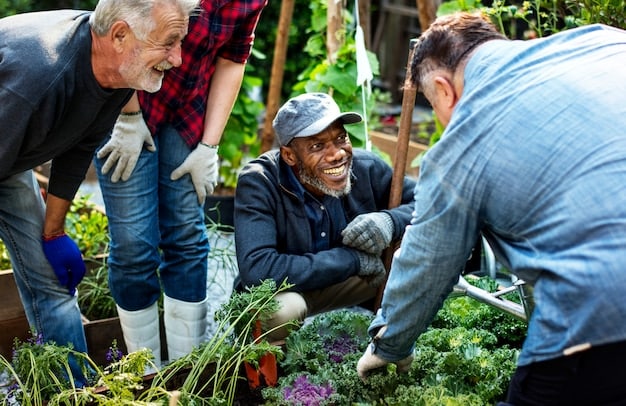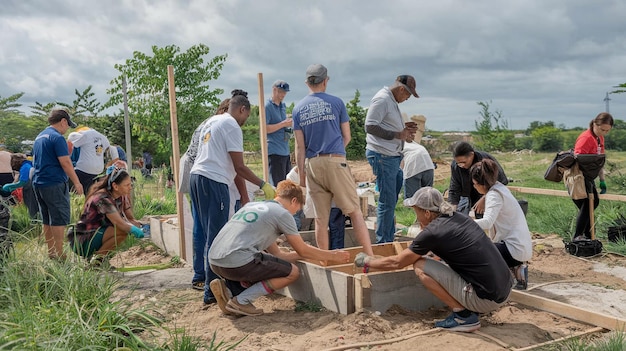Ethical Volunteering in the US: Find Projects That Help Locals

Ethical volunteering in the US means choosing projects that genuinely benefit local communities, respecting their needs and cultures, and ensuring your contribution makes a positive, sustainable impact without exploitation or harm.
Embarking on a journey of ethical volunteering in the US: How to find projects that truly benefit local communities is about more than just lending a hand; it’s about ensuring your efforts genuinely uplift and empower the people and places you’re helping.
Understanding Ethical Volunteering
Ethical volunteering goes beyond simply donating time. It’s about understanding the complexities of the communities you’re serving and ensuring your actions contribute positively without unintended consequences. It requires thoughtful consideration, cultural sensitivity, and a commitment to sustainable impact.
What Makes Volunteering Ethical?
Ethical volunteering prioritizes the needs and perspectives of the local community. It avoids perpetuating harmful stereotypes or dependencies. It focuses on empowerment and long-term solutions, rather than short-term fixes that may create more problems than they solve.
- Focus on community needs: Projects should address real needs identified by the community.
- Cultural Sensitivity: Respect local customs and traditions.
- Sustainable Impact: Opt for projects with lasting benefits.
Choosing the right volunteer opportunities is crucial. You want to ensure that your time and energy are contributing to a project that aligns with your values and produces tangible benefits for the community. Researching the organization, understanding its mission, and assessing its impact are all important steps in this process.

Identifying True Community Needs
One of the key aspects of ethical volunteering is making sure you are addressing a genuine need within the community. Often, what outsiders perceive as a necessity may not align with the community’s actual priorities or may have unintended negative consequences. To ensure your efforts are genuinely helpful, engage directly with community members and leaders to understand their perspectives and priorities.
Direct Engagement with Locals
Engaging with local residents provides invaluable insight into the challenges and opportunities within the community. This can involve participating in community meetings, conducting interviews, or simply spending time listening to people share their stories and experiences.
Look for projects where local voices are central to the decision-making process. These projects are more likely to be truly responsive to community needs and have a sustainable impact.
Prioritize initiatives that are led by local people. These individuals are more familiar with the cultural context and have a vested interest in the community’s success.
Assessing Volunteer Organizations
Not all volunteer organizations are created equal. Some may have good intentions but lack the expertise or resources to effectively address community needs. Others may prioritize their own agenda over the well-being of the people they serve, thus making it critical to thoroughly evaluate any organization before committing your time and energy.
Transparency and Accountability
Ethical organizations are transparent about their finances, operations, and impact. They are willing to share information about their projects, funding sources, and outcomes. They are also accountable to the communities they serve and are responsive to feedback and criticism.
Impact Measurement
The impact of an organization is an important thing to consider; ethical organizations regularly monitor and evaluate their projects to measure their effectiveness and identify areas for improvement. They use data to track progress, assess outcomes, and make informed decisions about how to allocate resources.
- Review their annual reports and financial statements.
- Ask for testimonials from people who have benefited from their services.
- Look for evidence of long-term impact and sustainability.
Ethical volunteering involves careful consideration of the organizations you support and ensuring they align with the values of integrity, transparency, and genuine commitment to community empowerment.
Avoiding “Voluntourism” Pitfalls
“Voluntourism,” a combination of volunteering and tourism, can sometimes do more harm than good. While the intention may be to help, poorly planned voluntourism can exploit communities, create dependency, and even take jobs away from locals. It’s important to be mindful of these pitfalls and choose projects that prioritize ethical and sustainable practices.
The Problem with Short-Term Projects
Short-term volunteer projects often fail to address the root causes of social problems. They may provide temporary relief but do little to create lasting change, and often lack a long-term vision. Focus on programs that are designed to build local capacity and empower communities to solve their own issues.
Support projects that provide training and education to local residents. By investing in local skills and knowledge, you can help communities become more self-sufficient.

Skills-Based Volunteering
Skills-based volunteering involves using your professional skills and expertise to support community organizations. Whether you’re a marketer, accountant, teacher, or healthcare professional, your skills can be invaluable to nonprofits, helping them improve their operations, expand their reach, and achieve their missions. By utilizing your unique talents, you can make a significant and sustainable impact on the community.
Matching Skills to Needs
Organizations often struggle with limited resources and expertise. Skills-based volunteering can fill critical gaps, providing nonprofits with access to specialized knowledge and support that they might not otherwise be able to afford. It is important to take the time to assess your skills and identify organizations that could benefit from your expertise.
The Importance of Cultural Sensitivity
Volunteering in a new community requires cultural sensitivity and respect. It’s important to understand and appreciate the local customs, traditions, and values. This involves being open-minded, non-judgmental, and willing to learn from others. Cultural sensitivity helps build trust and rapport with community members, ensuring your volunteer efforts are effective and respectful.
Respecting Local Customs
Before you start volunteering, take the time to learn about the local culture. Do some research online, read books, or talk to people who are familiar with the area. Be mindful of cultural differences in communication styles, social norms, and etiquette. By showing respect for local customs, you can avoid misunderstandings and build positive relationships with community members.
- Dress modestly and appropriately.
- Be mindful of your body language and gestures.
- Ask questions and seek clarification when you’re unsure about something.
Long-Term Engagement and Sustainability
Ethical volunteering is not a one-time event but an ongoing commitment. It involves building long-term relationships with community members and organizations, supporting their efforts over time, and contributing to sustainable solutions that address the root causes of social problems. This approach requires patience, dedication, and a willingness to invest in the community’s long-term well-being.
By staying involved over the long term, you can help build the capacity of local organizations, empower community members, and create lasting positive change.
| Key Point | Brief Description |
|---|---|
| 🤝 Community Needs | Prioritize projects addressing genuine local needs. |
| 🔍 Organization Assessment | Check for transparency and measurable impact. |
| 🌱 Sustainability | Focus on long-term engagement, avoid quick fixes. |
| 🌍 Cultural Sensitivity | Respect local customs and traditions. |
Frequently Asked Questions (FAQ)
▼
Ethical volunteering focuses on projects that genuinely benefit local communities, respect their culture, and avoid causing harm or dependency. It prioritizes long-term, sustainable solutions over temporary fixes.
▼
Research organizations thoroughly, look for transparency and community involvement, and check for measurable impact. Engage with local leaders to understand the true needs of the community directly.
▼
Avoid short-term projects that don’t address root issues, ensure you’re not taking jobs from locals, and be mindful of cultural impacts. Focus on programs promoting skill-building and local empowerment.
▼
Cultural sensitivity builds trust and respect within the community, ensuring that your efforts align with local values and traditions. It can prevent misunderstandings and promote effective collaboration.
▼
Skills-based volunteering involves using your professional expertise to support nonprofit organizations. This can fill gaps within organizations, providing access to specialized knowledge and resources that may otherwise be unavailable.
Conclusion
Ethical volunteering in the US: How to find projects that truly benefit local communities requires a thoughtful approach, prioritizing the needs and perspectives of the communities being served and choosing projects that promote sustainable, positive change. By engaging with respect, cultural sensitivity, and a commitment to long-term impact, volunteers can make a real difference in the lives of others.





